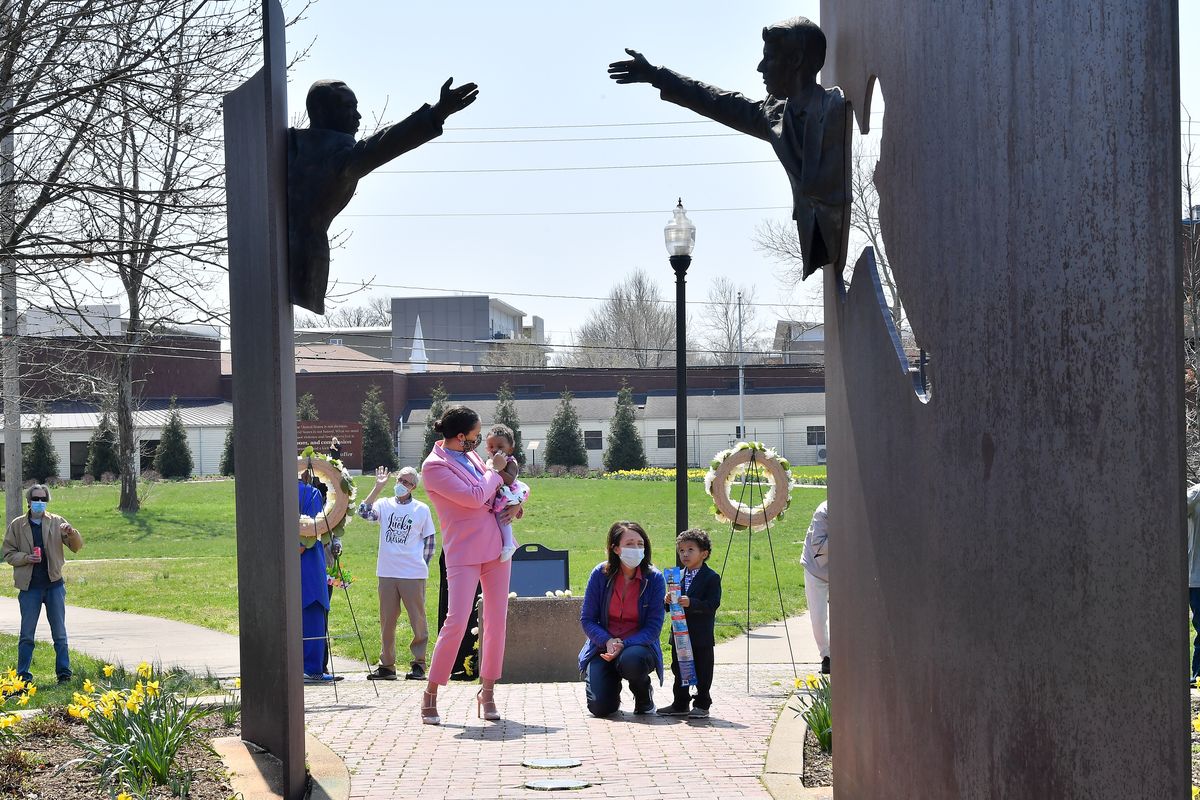On anniversary of Martin Luther King Jr.’s death, Gonzaga fans visit site where ally Robert Kennedy broke the shocking news 53 years ago
U.S. Sen. Maria Cantwell, D-Wash., center, visits with Landon Lockett, right, his Amanda Washington Lockett, left, who holds his sister, Olivia, at the Landmark for Peace Memorial at Dr. Martin Luther King Jr. Park on Sunday, April 4, 2021, in Indianapolis, Ind. (Tyler Tjomsland/The Spokesman-Review)Buy a print of this photo
INDIANAPOLIS – The Gonzaga hat on Claire Rudolf Murphy’s head conveyed her allegiance, but the vigor in the Spokane author’s voice had nothing to do with the nearby NCAA Tournament.
Murphy, who made the trek to Indianapolis to watch the Bulldogs potentially win their first national title, walked across a patch of grass and concrete at a downtown park she considers “sacred ground.”
Fifty-three years ago at this very spot, Senator Robert Kennedy stood on the bed of a flatbed truck on a presidential campaign stop and delivered shocking and sobering news to a mostly African American crowd.
Martin Luther King Jr. had been assassinated in Memphis.
Washington Senator Maria Cantwell’s late father, prominent Indianapolis politician Paul Cantwell, stood behind a visibly heartbroken Kennedy, who attempted to ease the community’s pain amid the loss of the civil rights giant.
“For those of you who are Black and are tempted to be filled with hatred and distrust at the injustice of such an act, against all white people, I can only say that I feel in my own heart the same kind of feeling,” Kennedy said in his April 4, 1968 Indianapolis speech.
“I had a member of my family (President John F. Kennedy) killed, he was killed by a white man. But we have to make an effort in the United States, we have to make an effort to understand, to go beyond these rather difficult times,” said Kennedy, who himself would end up assassinated.
Murphy, who along with a few other Gonzaga fans visited the historically significant park on the anniversary of King’s death, believes Kennedy’s words still resonate today with much of the country’s current racial strife.
She would know.
Murphy’s 18th book, “Martin and Bobby: A Journey toward Justice,” is about Kennedy and King’s relationship, as two men from different worlds who challenged and tested each other as wary allies in the fight for civil rights.
“This is a powerful place,” Murphy said, pointing toward the park’s Landmark for Peace Memorial, a statue that shows the slain leaders Robert Kennedy and King reaching out to each other.
Two months after King’s death, Robert Kennedy, a Democrat, was shot and killed in Los Angeles.
Robert Kennedy had apparently earned much of the trust of the African American community in one of the country’s most difficult times, as riots and unrest hit several cities in the wake of King’s assassination.
“He shared his pain and empathy,” said Darryl Locket, executive director of the Kennedy King Memorial Initiative who was also downtown on Sunday. “He had not spoken publicly about his brother’s death until that day.”
The Kennedy King Memorial both is in remembrance of both men at the downtown park and also features a building that serves an educational center, exhibiting the men’s pursuits and historical timeline.
Cantwell, along with her Gonzaga student nephews, was also in Indianapolis visiting her hometown during the Bulldogs’ big tournament run.
Murphy, Lockett, Cantwell and others were featured speakers in a 10-minute national television segment on King, Robert Kennedy and the memorial that was aired during the NCAA Tournament, and included prominent NBA figure Charles Barkley.
She is working to pass legislation to make it a recognized historical site.
“Our work is not done,” Cantwell said. “And what we have to do is recognize nationally that inequality needs to be part of the agenda.”
Murphy was excited the Bulldogs advanced to Monday’s NCAA title game against Baylor, still feeling the buzz of Jalen Suggs’ game-winning shot against UCLA the night before. But her fourth visit to this memorial meant even more.
Getting others from the Spokane area to see it made it even more special.
“I thought others from Spokane would want to see this, especially on this day,” she said. “It is incredible.”








